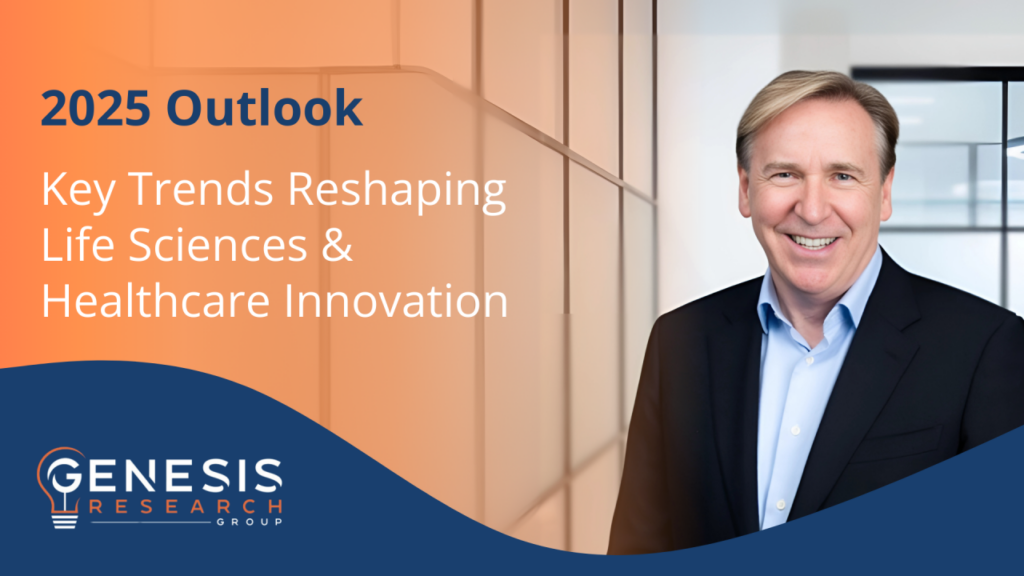
By David W. Miller, CEO, Genesis Research Group
As we look ahead for 2025, the life sciences industry stands at the intersection of rapid technological innovation and growing complexity. Buoyed by an optimistic outlook for growth and opportunity, the convergence of artificial intelligence (AI), real-world evidence (RWE), and integrated market access strategies will continue to shape how therapies are discovered, evaluated, and delivered to patients. In this shifting landscape, life science companies must contend with pressing challenges—from ensuring data quality and mitigating biases in AI-driven analyses to navigating intricate regulatory and payer requirements—while accelerating patient access to new and transformative treatments. This evolving landscape demands a fundamental shift in our approach to innovative and efficient product development.
Evolving political and policy landscape
The transition to a new U.S. administration in 2025 introduces important considerations for the life sciences sector. Policy shifts at key agencies, including the FDA, CMS, and NIH, and the ongoing implementation of JCA and IRA will impact aspects of drug development and commercialization. We expect additional focus on long-term patient outcomes following new product approvals. We also anticipate evolving regulatory and payer frameworks around AI applications in healthcare, changes to evidence requirements for regulatory and payer submissions, and potential new guidelines for real-world data utilization. These developments, combined with broader economic policy changes, will require life sciences companies to maintain agility in their strategic planning for product development and commercialization. The increasing focus on healthcare access and affordability by governments may accelerate the need for robust evidence-generation capabilities. Organizations will need to demonstrate clinical effectiveness and transparent economic and societal value. This environment reinforces the importance of flexible, data-driven approaches to evidence generation and stakeholder engagement.
Real-world evidence is a strategic imperative
Real-world evidence has evolved from a supporting capability into a core strategic imperative that drives decision-making across the entire product lifecycle. By harnessing diverse, high-quality data sources, organizations can accelerate regulatory approvals, strengthen payer value propositions, and gain deeper insights into diseases and treatment effectiveness across varied patient populations. The key to success lies in data sourcing and in generating fit-for-purpose evidence that combines methodological rigor with practical utility. Organizations that master this balance – delivering scientifically sound, actionable insights that resonate with regulators, payers, and clinicians – will be best positioned to navigate the increasingly complex healthcare landscape of 2025.
Artificial intelligence shifts from pilot to production
The conversation around AI has shifted dramatically over the past year. We’ve moved beyond asking whether AI will impact our industry to focus on how to implement it effectively at scale. AI is being implemented across various life science use cases, including accelerating target and lead identification, informing clinical trial design, medical writing, and enhancing patient stratification and predictive modeling for real-world outcomes. Yet the successful implementation of AI demands more than technological capability. Rigorous data quality standards, clear validation models, and seamless workflow integration must be developed while maintaining a balanced approach, keeping human intelligence and patient outcomes at the center of the effort.
The evolution of patient-centric healthcare
Healthcare delivery is becoming increasingly patient-focused, and I expect this trend will likely accelerate in 2025. This shift manifests in enhanced patient engagement platforms, more diverse data collection methods, and improved access to clinical research. Organizations that succeed in this environment will be those that effectively integrate patient perspectives and experiences throughout their development and commercial programs.
Collaborative partnerships become the foundation for innovation
The complexity of modern healthcare challenges demands strong partnerships and integrated approaches. We are seeing the emergence of partnerships that drive breakthroughs in personalized medicine and AI applications. Success increasingly depends on the ability to work effectively within these collaborative relationships while maintaining organizational agility.
The critical role of flexible adaptation
Organizational flexibility has become a critical success factor. The ability to rapidly respond to changing evidence needs, deploy cross-functional expertise effectively, and optimize resource allocation can mean the difference between market leadership and missed opportunities.
The Genesis perspective
At Genesis Research Group, we have built our model around these emerging needs through an integrated approach that combines flexible teaming, technological innovation, and deep expertise. Our Flexible Integrated Team (FIT) model enables seamless integration with client organizations, allowing rapid adaptation to changing needs while maintaining continuity of insight and institutional knowledge. This approach is enhanced by our technology-enabled solutions, including our RPR stakeholder engagement platform and EVID AI for evidence synthesis, which generate real-time insights while maintaining scientific rigor. Underpinning these capabilities is our global network of researchers, analysts, and scientists who provide strategic guidance and methodological expertise essential for success in today’s complex environment.
Looking ahead
As organizations prepare for the challenges and opportunities of 2025, they must evaluate their readiness across multiple dimensions. This includes assessing the comprehensiveness of their RWE strategy, their ability to integrate diverse data sources and insights, the scalability of their research partnerships, and most importantly, their success in keeping patient outcomes at the center of their efforts.
Moving forward together
The challenges of 2025 demand a new approach to innovation that combines scientific rigor with operational flexibility, technological capability with human insight, and global reach with local understanding. At Genesis Research Group, we are committed to helping life sciences companies navigate this evolving landscape through our unique combination of robust evidence generation, advanced analytics, flexible engagement models, therapeutic expertise, and deep insights into regulatory and payer requirements and expectations
As we look to the future, the opportunity to transform healthcare through innovative approaches has never been greater. I invite you to connect with us at solutions@genesisrg.com to explore how we can help your organization thrive in 2025 and beyond.
Explore our solutions online – Download our brochure – Sign up to our newsletter




